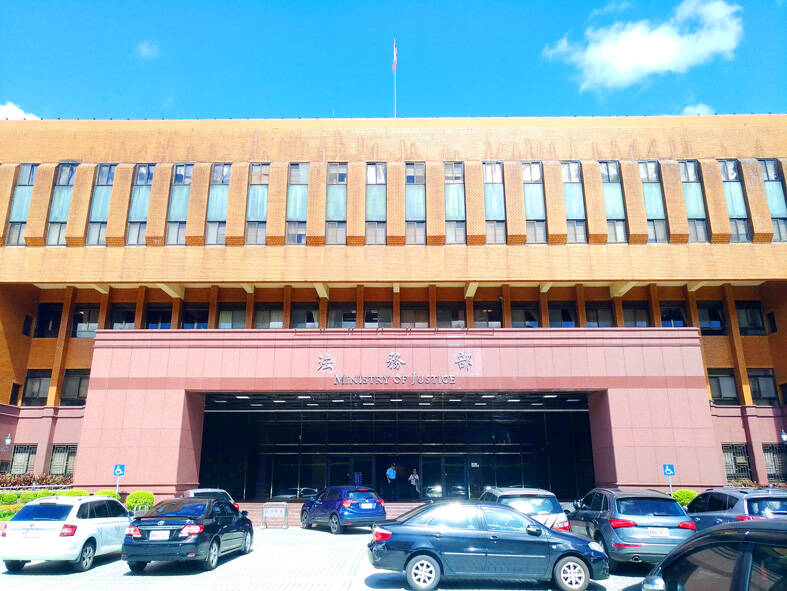The Ministry of Justice on Saturday reaffirmed the government’s strong opposition to legalizing cannabis, after a demonstration called for its decriminalization.
Wave Green, a cannabis decriminalization advocacy group, marched on Taipei’s Ketagalan Boulevard in front of the Presidential Office Building, urging the ministry to “end the war against cannabis” and “clear the stigma” associated with the plant.
The ministry said that the legal status of cannabis is aimed at maintaining public health, safety and stability.

Photo: Wu Cheng-feng, Taipei Times
It cited the UN 2021 World Drug Report as evidence that the long-term and regular use of cannabis harms people’s health.
As many countries in the world maintain bans on cannabis, Taiwan’s policy is in line with the international community, the justice ministry said.
An panel of neurologists, pharmacologists and toxicologists said that cannabis is “addictive” and can damage the central nervous system, the ministry said.
The panel’s conclusions led to the government classification of cannabis as a category 2 narcotic — along with opium poppy, coca, amphetamines, pethidine and pentazocine — in the Narcotics Hazard Prevention Act (毒品危害防制條例), it said.
Category 1 narcotics include heroin, morphine, processed opium, cocaine and their derivative products.
Under the act, a person convicted of using cannabis “shall be punished with a maximum three-year fixed-term imprisonment.”
Those who manufacture, transport or sell cannabis are subject to life imprisonment or a minimum 10-year fixed term imprisonment, and can also be fined up to NT$15 million (US$492,368).
The act also says that people who are found guilty of possession with the intent to sell cannabis could be punished with a jail term of five years or longer, and might also be fined up to NT$5 million.
The justice ministry urged people not to contravene the law as prosecutors and police have intensified their efforts to crack down against cannabis use.

Alain Robert, known as the "French Spider-Man," praised Alex Honnold as exceptionally well-prepared after the US climber completed a free solo ascent of Taipei 101 yesterday. Robert said Honnold's ascent of the 508m-tall skyscraper in just more than one-and-a-half hours without using safety ropes or equipment was a remarkable achievement. "This is my life," he said in an interview conducted in French, adding that he liked the feeling of being "on the edge of danger." The 63-year-old Frenchman climbed Taipei 101 using ropes in December 2004, taking about four hours to reach the top. On a one-to-10 scale of difficulty, Robert said Taipei 101

Nipah virus infection is to be officially listed as a category 5 notifiable infectious disease in Taiwan in March, while clinical treatment guidelines are being formulated, the Centers for Disease Control (CDC) said yesterday. With Nipah infections being reported in other countries and considering its relatively high fatality rate, the centers on Jan. 16 announced that it would be listed as a notifiable infectious disease to bolster the nation’s systematic early warning system and increase public awareness, the CDC said. Bangladesh reported four fatal cases last year in separate districts, with three linked to raw date palm sap consumption, CDC Epidemic Intelligence

Two Taiwanese prosecutors were questioned by Chinese security personnel at their hotel during a trip to China’s Henan Province this month, the Mainland Affairs Council (MAC) said yesterday. The officers had personal information on the prosecutors, including “when they were assigned to their posts, their work locations and job titles,” MAC Deputy Minister and spokesman Liang Wen-chieh (梁文傑) said. On top of asking about their agencies and positions, the officers also questioned the prosecutors about the Cross-Strait Joint Crime-Fighting and Judicial Mutual Assistance Agreement, a pact that serves as the framework for Taiwan-China cooperation on combating crime and providing judicial assistance, Liang

US climber Alex Honnold left Taiwan this morning a day after completing a free-solo ascent of Taipei 101, a feat that drew cheers from onlookers and gained widespread international attention. Honnold yesterday scaled the 101-story skyscraper without a rope or safety harness. The climb — the highest urban free-solo ascent ever attempted — took just more than 90 minutes and was streamed live on Netflix. It was covered by major international news outlets including CNN, the New York Times, the Guardian and the Wall Street Journal. As Honnold prepared to leave Taiwan today, he attracted a crowd when he and his wife, Sanni,